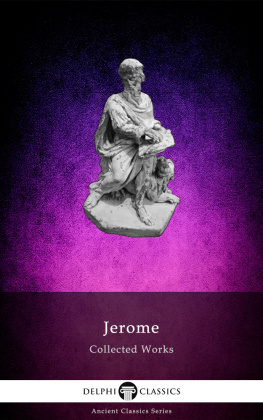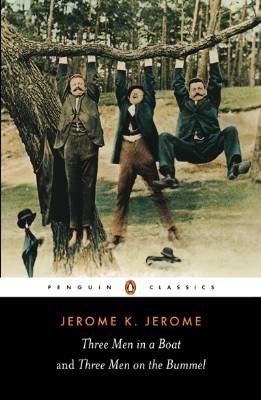
The Collected Works of
JEROME
(c. 342-420)

Contents

Delphi Classics 2022
Version 1

Browse Ancient Classics







The Collected Works of
JEROME OF STRIDON

By Delphi Classics, 2022
COPYRIGHT
Collected Works of Jerome
First published in the United Kingdom in 2022 by Delphi Classics.
Delphi Classics, 2022.
All rights reserved. No part of this publication may be reproduced, stored in a retrieval system, or transmitted, in any form or by any means, without the prior permission in writing of the publisher, nor be otherwise circulated in any form other than that in which it is published.
ISBN: 978 1 80170 064 1
Delphi Classics
is an imprint of
Delphi Publishing Ltd
Hastings, East Sussex
United Kingdom
Contact: sales@delphiclassics.com

www.delphiclassics.com
The Translations

Roman ruins at Ljubljana, Slovenia, believed by some to be the site of ancient Stridon, Roman province of Dalmatia Jeromes birthplace
The Life of Paulus the First Hermit (c. 375)

Translated by W. H. Fremantle, G. Lewis and W. G. Martley, 1893
CONTENTS

A depiction of Saint Jerome from the Nuremberg Chronicle, c. 1493

Saint Paul, The First Hermit by Jusepe de Ribera, Museo del Prado, 1640
INTRODUCTION
The Life of Paulus was written in the year 374 or 375 during Jeromes stay in the desert of Syria, as is seen from c. 6, and was dedicated to Paulus of Concordia as stated in Jeromes Epistle x. c. 3.
THE LIFE OF PAULUS THE FIRST HERMIT
1. It has been a subject of wide-spread and frequent discussion what monk was the first to give a signal example of the hermit life. For some going back too far have found a beginning in those holy men Elijah and John, of whom the former seems to have been more than a monk and the latter to have begun to prophesy before his birth. Others, and their opinion is that commonly received, maintain that Antony was the originator of this mode of life, which view is partly true. Partly I say, for the fact is not so much that he preceded the rest as that they all derived from him the necessary stimulus. But it is asserted even at the present day by Amathas and Macarius, two of Antonys disciples, the former of whom laid his master in the grave, that a certain Paul of Thebes was the leader in the movement, though not the first to bear the name, and this opinion has my approval also. Some as they think fit circulate stories such as this that he was a man living in an underground cave with flowing hair down to his feet, and invent many incredible tales which it would be useless to detail. Nor does the opinion of men who lie without any sense of shame seem worthy of refutation. So then inasmuch as both Greek and Roman writers have handed down careful accounts of Antony, I have determined to write a short history of Pauls early and latter days, more because the thing has been passed over than from confidence in my own ability. What his middle life was like, and what snares of Satan he experienced, no man, it is thought, has yet discovered.
2. During the persecutions of Decius and Valerian, [a.d. 249260] when Cornelius at Rome and Cyprian at Carthage shed their blood in blessed martyrdom, many churches in Egypt and the Thebaid were laid waste by the fury of the storm. At that time the Christians would often pray that they might be smitten with the sword for the name of Christ. But the desire of the crafty foe was to slay the soul, not the body; and this he did by searching diligently for slow but deadly tortures. In the words of Cyprian himself who suffered at his hands: they who wished to die were not suffered to be slain. We give two illustrations, both as specially noteworthy and to make the cruelty of the enemy better known.
3. A martyr, steadfast in faith, who stood fast as a conqueror amidst the racks and burning plates, was ordered by him to be smeared with honey and to be made to lie under a blazing sun with his hands tied behind his back, so that he who had already surmounted the heat of the frying-pan might be vanquished by the stings of flies. Another who was in the bloom of youth was taken by his command to some delightful pleasure gardens, and there amid white lilies and blushing roses, close by a gently murmuring stream, while overhead the soft whisper of the wind played among the leaves of the trees, was laid upon a deep luxurious feather-bed, bound with fetters of sweet garlands to prevent his escape. When all had withdrawn from him a harlot of great beauty drew near and began with voluptuous embrace to throw her arms around his neck, and, wicked even to relate! to handle his person, so that when once the lusts of the flesh were roused, she might accomplish her licentious purpose. What to do, and whither to turn, the soldier of Christ knew not. Unconquered by tortures he was being overcome by pleasure. At last with an inspiration from heaven he bit off the end of his tongue and spat it in her face as she kissed him. Thus the sensations of lust were subdued by the intense pain which followed.
4. While such enormities were being perpetrated in the lower part of the Thebaid, Paul and his newly married sister were bereaved of both their parents, he being about sixteen years of age. He was heir to a rich inheritance, highly skilled in both Greek and Egyptian learning, gifted with a gentle disposition and a deep love for God. Amid the thunders of persecution he retired to a house at a considerable distance and in a more secluded spot. But to what crimes does not the accursed thirst for gold impel the human heart? His brother-in-law conceived the thought of betraying the youth whom he was bound to conceal. Neither a wifes tears which so often prevail, nor the ties of blood, nor the all-seeing eye of God above him could turn the traitor from his wickedness. He came, he was urgent, he acted with cruelty while seeming only to press the claims of affection.
Next page




























